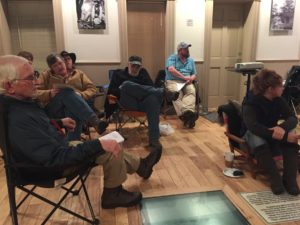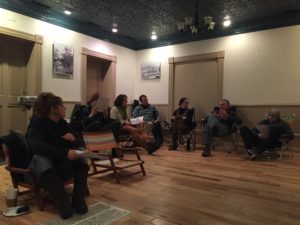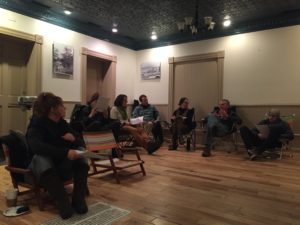 Our February Philosophy Drive-In was wonderful! Our group of philosophy & movie-lovers stayed warm in our “night under the stars without the cars” bungalow, enjoyed tasty treats, good conversation, and the 2001 drama Thirteen Conversations About One Thing. An existentially moving (and very Kierkegaardian in nature) film, this film looks at the lives of five seemingly disparate individuals whose paths intersect in ways that unexpectedly impact each and everyone of them. The underlying philosophical quandry in play….happiness. What is it and how do we achieve it?
Our February Philosophy Drive-In was wonderful! Our group of philosophy & movie-lovers stayed warm in our “night under the stars without the cars” bungalow, enjoyed tasty treats, good conversation, and the 2001 drama Thirteen Conversations About One Thing. An existentially moving (and very Kierkegaardian in nature) film, this film looks at the lives of five seemingly disparate individuals whose paths intersect in ways that unexpectedly impact each and everyone of them. The underlying philosophical quandry in play….happiness. What is it and how do we achieve it?
Some of the things we explored during our post-film discussion included:
- What does luck have to do with happiness?
- Do less extreme views of the world (i.e., less black and white) contribute to happiness?
- What role might “service to others” play in happiness?
- What is the difference between happiness and contentment?
- Can you be vengeful and happy at the same time?
- Where does the ego come into play as it concerns happiness?
- How does our conception of “fairness” relate to happiness?
- And more…
Read a synopsis of the film, some of the philosophical questions raised, and a brief overview of the religion-science relationship debate & epistemology here!
Film Trailer & Synopsis
Thirteen Conversations About One Thing is a 2001 drama film directed by Jill Sprecher. The screenplay by Sprecher and her sister Karen focuses on five seemingly disparate individuals whose paths intersect in ways that unexpectedly impact their lives. A physics professor approaching middle age decides to change his life with unexpected results. A rising young prosecuting attorney’s plans are thrown into disarray as the result of a single careless act while distracted. A woman reluctantly faces her husband’s infidelity. An envious insurance claims manager with family problems seeks revenge on a cheerful coworker, but has second thoughts. And an optimistic young cleaning woman awaits a miracle, only to have her faith shaken by a traumatic event. These ordinary people all find themselves asking the fundamental question philosophers have pondered throughout history: What is happiness, and how does one achieve it?







